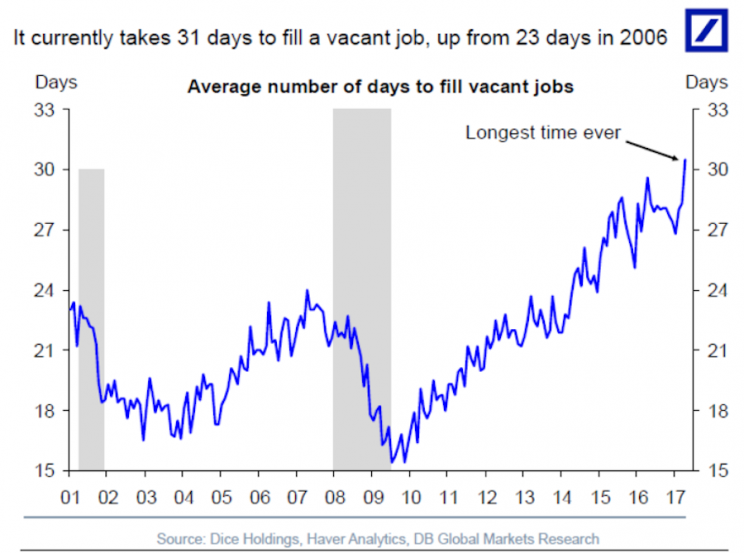It’s never been harder to fill a job in America
It has never been harder to fill an open job in the United States.
According to a chart from Deutsche Bank economist Torsten Sløk, it now takes 31 days to fill an open job in America, up from 23 days in 2006 and about 15 days in 2009.
There is perhaps no better way to visualize the “tight labor market” (a decidedly wonky term) that economists and folks on Wall Street often talk about — if you’re looking for workers, it’s tough to find help.

This chart also vibes with commentary we’ve heard from businesses recently that finding qualified workers is one of their biggest challenges.
Earlier this month, the National Federation of Independent Business’s small business optimism report showed that, “85% of those hiring or trying to hire [reported] few or no qualified applicants for their open positions.”
In May, the NFIB’s report found that 33% of all small business owners couldn’t fill a job in the prior month, the highest reading since November 2000. In April, there were 6.04 million jobs open in the U.S., the most on record.
Also out earlier this month was the Federal Reserve’s latest Beige Book report — a collection of economic anecdotes from across the country — which showed that across the country businesses said the same.
In the Philadelphia Fed’s region, the report said, “Pennsylvania staffing firms struggled to find qualified and committed workers.” The report added that, “Staffing contacts reported spending more time and money on recruiting labor and refilling positions after the initial hire quit, sometimes after just a few days. Workers appear to have less loyalty to the job, and more job-hopping is showing up on résumés.”
Of course, there is a solution for businesses who can’t find the workers they desire — pay more.
The Philly Fed’s assessment of employment conditions concluded with, “However, one large retailer reported having no difficulty getting quality job candidates in locations throughout the District after raising its base wage last year.”
In June, average hourly earnings rose 2.5% over the prior year, a disappointment to economists who expect that with the unemployment rate hovering at 4.4% there’d be a bigger acceleration in worker pay.
And in addition to employers that appear reluctant to raise wages, Yahoo Finance’s Rick Newman has reported businesses are also dealing with a workforce that increasingly distrusts potential employers.
“I hear about these labor shortages, and I think, that’s a crock,” manufacturing salesperson Kristin Charlton told Yahoo Finance. “When I compare salaries to what they were 10 years ago, they’re not significantly higher. It’s not enough for me to move across the country.”
And so when it comes to employers finding qualified workers and workers finding their skills truly valued, there still exist clear divides between what both sides expect and are willing to offer.
Employees won’t move to where the jobs are, and employers won’t pay what is needed to fill open jobs.
And that’s why it’s never taken longer to fill an open job in America.
—
Myles Udland is a writer at Yahoo Finance. Follow him on Twitter @MylesUdland
Read more from Myles here:

